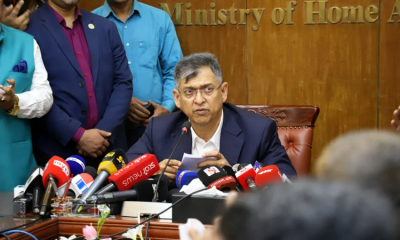Under a catastrophic climate change scenario where global temperature will rise by 3.6°C by 2100, Bangladeshi people will suffer moderate to severe food insecurity by nearly 5% between 2021- 2040, according to a recent report by the Grantham Research Institute on Climate Change and the Environment of London School of Economics (LSE).
The report sheds light on the historical efforts and emerging duel crisis faced by Bangladesh in ensuring food security amidst climate change and global conflict.
In contrast, if the Paris Agreement target of limiting temperature rise to well below 2°C is achieved, the proportion of people affected by food insecurity would increase by 4.4% between 2021- 2040.
This suggests that strong action taken globally to mitigate climate change will have clear food security benefits in countries like Bangladesh.
Bangladesh is at the forefront of combating the detrimental effects of climate change on food security.
According to the report, "climate change poses a severe global threat to food security, with heightened vulnerability in Bangladesh. The ongoing Russia-Ukraine conflict exacerbates the challenge, causing significant surges in staple food, fuel, and fertilizer prices, raising concerns about poverty levels and worsening food insecurity.
"In Bangladesh, long-experienced cyclones, droughts, and floods are now intensified by climate change, leading to more frequent and intense extreme weather events. The dual challenge of increasing flooding and heightened extreme heat days compounds issues, resulting in reduced crop yields, livestock health issues, altered pest and disease distribution, and decreased agricultural labor supply.
This, in turn, leads to income reduction, restricting households` ability to afford sufficient nutritious food, the report reads.
Government support, including climate services, crop insurance, and storage practices, will further bolsters the sector. Acknowledging agriculture`s climate impact, Bangladesh focuses on mitigation through practices like alternate wetting and drying, improved fertilizer management, and addressing residue burning.
Professor Robinson the Grantham Research Institute, LSE said, "Bangladesh`s government is already promoting climate-smart agricultural practices, and has a number of safety nets in place, but yet more efforts will be needed to build resilience across the food value chain, to improve food and nutritional security across the population."
As Bangladesh continues to face climate change and its impact on food security, experts urge concerted efforts from policymakers, researchers, and stakeholders to adopt adaptive strategies and prioritize sustainable practices.
Dr. Shouro Dasgupta - Environmental Economist, Euro-Mediterranean Center on Climate Change and Visiting Senior Fellow at the Grantham Research Institute, LSE said “Proactive policies targeting both food production such as reinsurance schemes for smallholder farmers and access to food and nutrition such as cash transfer are needed.”
Bangladesh has made progress, increased efforts, including extended research, targeted consumer protection, and improved healthcare access, are necessary to address rising temperatures.
Despite associated costs, these investments promise a more resilient and productive population amidst changing climate conditions.
The report also highlighted that Bangladesh has made progress in improving food production and security, with a positive trend in food security measures.
The report stated, Bangladesh should embrace climate-smart agriculture, incorporating saline-tolerant crops, aquaculture, resilient rice varieties, agroforestry, and sustainable land management.
Professor Elizabeth Robinson, said “Bangladesh has made remarkable progress in terms of improving food and nutrition security. Yet climate change is making further improvements even harder."
Government initiatives like shrimp aquaculture and the System of Rice Intensification (SRI) signify progress. The National Food and Nutrition Security Policy (2023–2050) stresses diverse diets.
Climate-smart technologies enhance nutrient-dense crops, while safety nets aid affordability.










-20260225072312.webp)







-20260224075258.webp)












-20260219054530.webp)
-20260218060047.jpeg)
